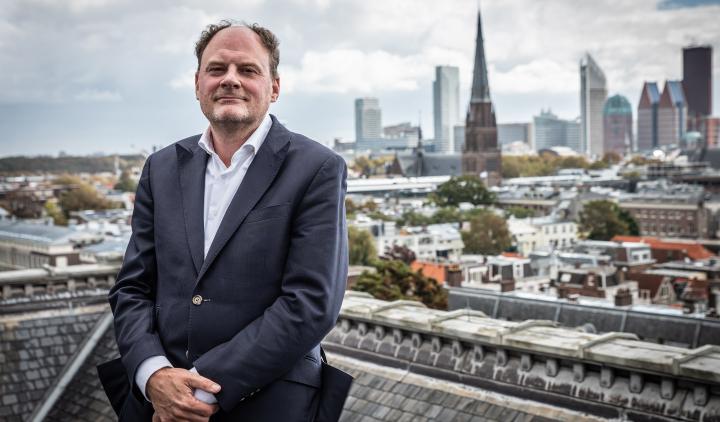'Internationalisation should be about talent, but is becoming politicised'

There's more and more resistance to the presence of foreign students at Dutch universities. After eight years heading Nuffic, Weima says he's seeing a turnaround in the former enthusiasm. He is leaving the role to become the chair of PO Council, an umbrella organisation for Dutch primary schools.
Is it strange that people are starting to question the benefits of internationalisation? The number of foreign students only keeps on rising.
“Yes, especially when it comes to universities. That growth in the number of international students actually received massive support from the government for many years. It was a joint ambition to attract more international students to our universities and, as a result, the Netherlands has become very popular as an academic destination. The value of having these students here has not declined, but now many Dutch universities are nearly at full capacity, so we have to guide things in the right direction.”
How is that going to work?
“There is draft legislation currently waiting for approval from the Senate, which would enable English-taught programmes to apply quotas for international students. In practice, this would allow them to control the number of international students while continuing to grant access to Dutch students.”
Can we say that everyone who is able to pay for the tuition fees is welcome to study here?
“No. That is what they do in Australia. Higher education is one of their top sectors, like horticulture is in the Netherlands, and they recruit international students with a profit margin. Personally, I think it's a better strategy to focus on attracting talent. That's something completely different from trying to bring as many students as possible to our country. We also don’t have enough teaching faculty or student housing to accommodate a much bigger flow of international students.”
The outgoing government would like to focus on students in the ICT and technological fields.
“This is a point of view that arose in splendid isolation: they did not consult anyone working in higher education. I would say it is a bit short sighted. We have many foreign teachers, across all disciplines, who initially came to the Netherlands as students, just like there are many Dutch researchers who go abroad for work. Internationalisation is good for higher education.”
 We've been seeing news stories about russian diplomats spying on Dutch higher education and Chinese researchers who are here to improve their country's military expertise. Does this change the general attitude towards internationalisation?
We've been seeing news stories about russian diplomats spying on Dutch higher education and Chinese researchers who are here to improve their country's military expertise. Does this change the general attitude towards internationalisation?
“Geopolitical tensions have increased and there are more ways to digitally infiltrate other countries. Knowledge security is a much bigger concern nowadays compared to eight years ago. But what is the solution? You can’t isolate yourself from these countries. We need to acquire knowledge about the Russian and Chinese language and culture, if only for the reason that these countries are increasingly exerting their influence on the world stage.”
A knee-jerk reaction would be to just shut the borders.
“That would be like killing a fly with an elephant gun. We have to stay alert, but there are around 5,000 Chinese students in this country. You can’t act as if all of them have suspicious intentions. Instead, we should focus on maintaining good relations with them in the future, both in business and in diplomatic terms. It is good for us if they go back home with a positive image of the Netherlands."
What policy do you think a new coalition government should pursue?
“I would carry on with the Orange Knowledge Programme, set up by the outgoing Minister of Foreign Trade and Development Cooperation, Sigrid Kaag, in collaboration with around fifty countries. Primarily focused on Africa, the programme funds collaborative projects and provides scholarships. It sometimes seems as though the Netherlands pays little attention to that continent, even though it is emerging as a strong global player.
"The Dutch Minister of Education, Ingrid van Engelshoven, wants to get rid of the NL Alumni Network, which is how we keep in touch with our international graduates. That would basically destruct cultural and political capital. The costs of the programme are relatively low, and it is extremely important to maintain an alumni network for business and diplomatic relations. In addition, I would keep at least a few of the Neso offices that the current government is planning to close.”
Neso offices are like embassies for higher education. Is it so strange that the government wants to delegate that role to the actual embassies?
“I hope that the new coalition government will take another close look at them. Educational attachés are important, but they can’t assume the same role as the NESO offices. Our NESO offices include local staff who have a good understanding of higher education in those countries. That is something greatly appreciated by both diplomats there and universities here. In times of geopolitical tension, higher education and research are sometimes the only areas in which you can maintain good relations.”
There’s a political desire to protect the Dutch language and limit English-taught education in the Netherlands. Is that going to undermine internationalisation?
“We must have a more nuanced discussion. This is becoming highly politicised, which is a shame. The sole focus should be on quality and talent. It is also peculiar, for example, that just two percent of Dutch people complete a full educational programme outside the country. This number could easily be doubled. For example, why do so few Dutch students go study in Germany? Their universities are excellent, tuition is relatively cheap, you can transfer your student funding and you will learn a language that will be an asset for the rest of your life.”
Has the coronavirus crisis thrown a wrench into internationalisation?
“The number of international students kept rising over the last year, particularly students from other European countries. The number of people interested in doing a degree in the Netherlands remains high. But I have to say that these are hard times for international students in the Netherlands. Everything is online, which leads to high levels of loneliness. Remote learning is not a magic bullet.”
Photos: Alex Schröder